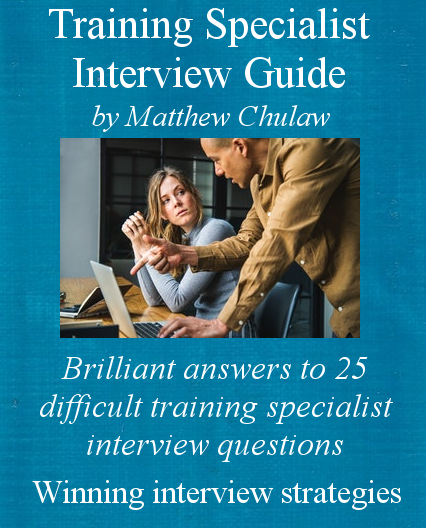Dear future Training Specialist,
I will keep this page short and to the point. Here’s what I have for you today:

In the eBook, you will find multiple great answers to each of the following questions:
- What goals would you set for yourself in this job?
- How do you identify training needs? Walk me through skills gap analysis.
- How would you evaluate effectiveness of an educational program?
- Do you prefer to outsource employees’ learning, or organize in-house training?
- What’s the most challenging training scenario you have faced? What did you do?
- Things don’t always work as expected in this job. How do you deal with disappointment?
- How do you imagine a typical day in work?
- This is a busy place. How would you ensure that the schedule of training sessions does not interfere with other duties of employees?
- What is your experience with e-learning as a training delivery method?
- Describe a conflict you had with your colleague, someone you were training.
- How would you train a new sales representative? Walk me through the process.
- Could you create training materials/manuals from scratch? Do you think it is important to have customized training materials?
- Describe the biggest failure of your professional career.
- What are your favorite teaching methods, and why do you prefer them?
- … and ten other tough questions you will often face in your interview for a job of Training Specialist.
Check the sample to see how this eBook can help you:
Sample from the eBook
Q 8: What’s the most challenging training scenario you have faced?
Hint: The attitude you show is more important than the particular situation/scenario you narrate. What I personally find very difficult is trying to teach someone a subject that exceeds their abilities.
Actually it is very common in IT business. Recruiters are forced to hire under-qualified candidates, or people who have the desired IT skills but lack other essential things (such as social skills, for example).
They want to meet their quote, they are afraid of a failure, and sooner or later they are forced to make some stupid decisions. And then they believe that a Training Specialist will manage to overcome the skills gap.
But we are not magician, or alchemists. Not every goal can be reached with every employee…
In such a scenario it is important to demonstrate that you did your best, tried various training methods, or even employed trainers from outside, trying to reach a desired result. But at the end it did not work—simply because it could not work. It’s not your mistake—it’s mistake of the recruiters, who hired a wrong person.
But perhaps you should not say the last sentence, since companies do not like to hire people who blame their colleagues for mistakes.
Other tough training scenarios include employees who would not cooperate, not respect you, or teaching something that’s not your strength (but you’re forced to lead the training, due to budget restrictions or other reasons)…
If this is your first job application, say what you would do in a tough training scenario.
Sample answers
– This is my first job application in the field, so I am yet to experience difficult training scenarios. However, I imagine it is tough to work with people who aren’t willing to learn, or who lack humility.
What is more, some people want to, but are not capable of mastering particular subject or skill. And it doesn’t matter how well the training is designed. I expect to experience these situations, will try my best to overcome them, and I am also ready to accept some setbacks. It’s simply a part of the job.
– I remember once that we were basically forced to hire under-qualified testers, who had no experience with the software environment which we used in the company.
But we needed them badly, and I was supposed to overcome the skills gap. After having initial interviews with them and doing some IQ tests, I immediately knew the magnitude of task in front of me, since I had the feeling that two of them just weren’t capable of learning the environment.
They weren’t capable of learning it within a few months, bearing their starting position. But I tried my best, hired excellent trainer from outside of the company, and also utilized some e-learning platforms in the process. I oversaw the entire process closely, and intervened whenever necessary.
At the end the outcome was as expected—we had to terminate the contract with two of them, and obviously the company lost money in the process. But that’s just how it goes in this job—we should try our best, but we should also accept that each person has certain limits, and we can not perform miracles with them.
Q 11: How do you imagine a typical day in work?
Hint: The key is to show proactive approach to work.
Good training specialists do not sit in their comfy offices, waiting for orders from managers or executives, or for some crisis to wake them from their daydreams. They keep working on new training materials; they monitor the employees, they are always looking to do something, to improve something. They send emails, they reach out, and they educate the others or themselves…
Obviously you can also list particular working duties from the job description—that’s another good answer. In both cases, it is crucial to show initiative, to demonstrate that you do not need someone else to motivate you to do something.
Sample answers
– I imagine having my hands full from morning to afternoon. Certainly I will try to have a clear schedule for each day, and lists of tasks I want to carry out. This should help me to be effective in work. In my opinion, the core of this job consists in the training itself, which means either conducting the sessions, or organizing and overseeing them. But I expect to take care also of some administrative work, and obviously designing new training materials and programs, as well as evaluating the effectiveness of existing one. Well, there’s a lot to do, and I am looking forward to it.
– I imagine that my days in the office won’t be routine. I may spend some days doing orientation with new hires, and other training them. I imagine sending a lot of emails, making phone calls, and spending a significant portion of my time in front of a computer, working on the training plans and programs. However, the most important thing is to have clear goals—what we try to achieve as a business, and what my role is in this process. I am sure that we will manage to come up with answers to these questions together, and from that everything else starts—my quarterly and yearly goals, weekly and daily schedule, etc.
End of the sample
These are just two questions. You will find 25 in the eBook, including personal, behavioral, and technical questions. But that’s not all.
To ensure you will get the job, I included in the book six principles you need to understand before you can ace this interview.
Without talking too much about them, let me show you another sample from the book:
Sample no. 2
Principle no. 3: Show your willingness (or even your eagerness) to learn, and adapt
Though creativity is essential in this role, and you will often prepare training materials (or organize training sessions) from scratch, you will still have to adapt to processes and training methods they have in place (and it could take them years to develop these methods and programs).
It would be a mistake to claim that you were ready to start the job without any training. That you simply want to walk in, redesign everything they do, and make everyone follow your leadership…
That’s not how it works.
To start with, you will plan and organize the delivery of training programs they already have in place, and you will help transition of new employees into the workplace, thus allowing them to become productive and efficient members of the team.
To do this effectively, you need not create and give orders. You need to listen, to talk to managers and other leading figures in various departments. You’ll do it to understand the ins and outs of the company, and of each position within the corporate hierarchy.
This will allow you to help new employees (or the existing one) to quickly find their place in the corporate puzzle, and to feel happy in work.
These duties will always represent the core of your job. Designing new trainings, devising new instruction materials, selecting teaching aids, and measuring progress and effectiveness of training processes, comes just after that. It can’t be any otherwise…
The key is to show your willingness to learn, and follow their way of doing things—at least at the beginning. You will get a chance to prove your creative abilities later in the job.
…………
End of the sample

So that’s it. I do not want to waste your time with lengthy sales pages, and imaginary discounts or fake reviews, just like other people do on their websites.
You have read the samples, you know what the eBook is about, and surely you can tell whether it will help you.
I sincerely believe it will. And you can read it easily in two or three hours, it’s 13,000 words. Only things that truly matter, no secondary content.
Plus, of course, like with everything else we sell here on InterviewPenguin.com, you have a risk free sixty days money back guarantee. If you don’t like this eBook for any reason, or no reason at all, just let me know (email me at matthew[at]interviewpenguin[dot]com) within 60 days and we will give you a full refund.
Quick Summary

- Brilliant answers to twenty-five difficult questions you may get in your interview for a Training Specialist job.
- Published in 2019, latest update: February 2024.
- Several sample answers to each question, so you can choose one that reflects your values and experience.
- Six principles of acing the interview, things you simply need to know in order to make the right impression on the hiring managers.
- Instant download, .PDF format (you can read it on any device (mobile, kindle, PC), and you can easily print it).
- Secure and simple checkout with PayPal, you can pay with your credit/debit card, or with your PayPal account.
- Price: $9.95, one time payment, no hidden fees or upsell. 60 days risk free money back guarantee. Sold exclusively on InterviewPenguin.com.
- Click the checkout button below to proceed to the payment.
(After the payment you will be directed back to our website, to a protected page, to download your eBook. You will also receive a download link and instructions to your email, just to ensure that you will get the book without waiting, even if the redirect fails.)
That’s it. Your interview does not have to be stressful, or difficult. You can interview with confidence, and give brilliant answers to all tough questions. Download the guide today, and succeed in your interview.
Sincerely,
Matthew Chulaw,
Your personal job interview coach
P.S. Feel free to send me a message if you are still not sure how this guide will help you to get a job. I try my best to answer all messages within twelve hours (matthew[at]interviewpenguin[dot]com).
